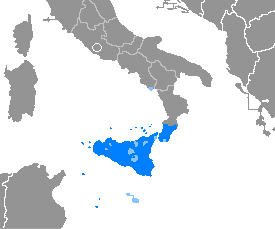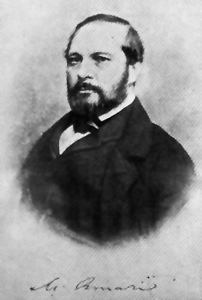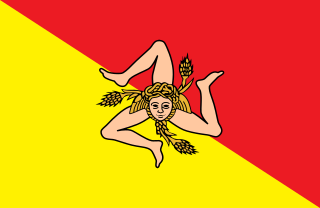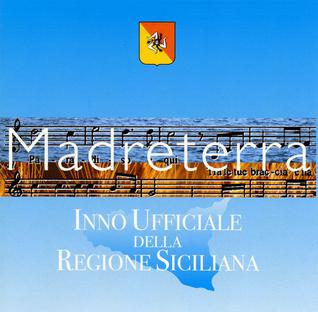
Sicilian is a Romance language that is spoken on the island of Sicily and its satellite islands. It also has a variant, Calabro-Sicilian, because it is also spoken in southern Calabria, where it is called Southern Calabro, specifically in the Metropolitan City of Reggio Calabria, whose dialect is viewed as being part of the continuum of Sicilian. Dialects of central and southern Calabria, the southern parts of Apulia and southern Salerno in Campania, on the Italian peninsula, are viewed by some linguists as forming with Sicilian dialects a broader Far Southern Italian language group.

Michele Amari was an Italian patriot and historian.

The flag of Sicily shows a triskeles symbol, and at its centre a Gorgoneion and a pair of wings and three wheat ears.

The Movement for the Autonomies is a regionalist, Christian-democratic political party in Italy, based in Sicily. The MpA, whose founder and leader is Raffaele Lombardo, demands economic development, greater autonomy and legislative powers for Sicily and the other regions of southern Italy.

Francavilla di Sicilia is a town and comune in the Metropolitan City of Messina on the island of Sicily, southern Italy.

Isola delle Femmine is an Italian town in north-western Sicily, administratively part of the Metropolitan City of Palermo.

Gallo-Italic of Sicily is a group of Gallo-Italic languages found in about 15 isolated communities of central eastern Sicily. Forming a language island in the otherwise Sicilian language area, it dates back to migrations from northern Italy during the reign of Norman Roger I of Sicily and his successors.

Frate Atanasiu di Iaci or Athanasiu da Jaci was a Benedictine monk and historiographer from Aci. He wrote Vinuta di lu re Japicu in Catania (c.1295), a Sicilian chronicle of the arrival and stay of James I in Catania in May 1287. He may also be the author of another Sicilian history, Lu rebellamentu di Sichilia, written circa 1290, by an anonymous person of Messina. Vincenzo di Giovanni suggested that Atanasiu was of Saracen ancestry.

In Italy, there are some active movements and parties calling for autonomy or even independence for the areas comprised within the historical Kingdom of the two Sicilies: that is, Southern Italy and/or the region of Sicily. No political movement promoting these ideas has ever been successful in gaining traction among the population. The movement remains on the fringes with no representation in the Italian parliament.

"Madreterra" is the official anthem of Sicily since 2003. It was the first regional anthem in Italy, and was written by Vincenzo Spampinato, whom was chosen after an official competition. However, other songs have been traditionally regarded as national anthems of Sicily. The lyrics are in Italian. Madreterra was performed in public for the first time at the Ancient theatre of Taormina on 14 June 2003 by the Sicilian Symphony Orchestra and the Musa 2000 Choir.
Gaetano Cipolla is a retired professor of Italian and Chairman of the Department of Modern Foreign Languages at St. John's University in New York City. He was born and raised in Francavilla di Sicilia in Messina Province, Sicily and emigrated to the US in 1955. He received his Bachelor of Science (1961) from New York University, Master of Arts (1969) from Hunter College (CUNY), and the PhD (1974) from New York University. He joined the faculty of St. John's University in 1974 and retired in 2011.
The Barbaresca or Barbaresca Siciliana is a breed of large fat-tailed sheep from the Mediterranean island of Sicily, in southern Italy. It derives from the cross-breeding between indigenous Sicilian Pinzirita sheep with fat-tailed Barbary sheep of Maghrebi origin. These were probably brought to the island after the Muslim conquest of Sicily in the 9th century; Arabic texts preserved at Agrigento document the movement of large numbers of sheep to the Sicilian interior.

Nino Terzo was an Italian actor.

Sicula Leonzio, also commonly known as Leonzio, is an Italian football club located in Lentini.
The Chronicle of Cambridge or Cambridge Chronicle, also known as the Tarʾīkh Jazīrat Ṣiqilliya, is a short, anonymous medieval chronicle covering the years 827–965. It is the earliest native Sicilian chronicle of the emirate of Sicily, and was written from the perspective of a Sicilian Christian of the 10th or 11th century. It survives in two versions: a Greek version in two manuscripts and an Arabic version in one. For years only the Arabic text kept in Cambridge University Library was known, but in 1890 a Greek redaction was discovered. The Greek texts are found in the Vatican Library and the Bibliothèque nationale de France. It has been translated into English, Italian and French.

Cademia Siciliana is a transnational non-profit organization founded in 2016 by a group of Sicilian language academics, activists, researchers, and students with the mission to promote the Sicilian language through education, research, and activism. The organization has published an orthographical proposal for the Sicilian language, and maintains several Sicilian language research and technology projects. Including translation and language advocacy projects for several popular applications and platforms such as Firefox, Telegram, Facebook and Android Keyboard.
Sicilian orthography uses a variant of the Latin alphabet consisting of 23 or more letters to write the Sicilian language.
Now Sicily is a regional centrist Italian political party active in Sicily.











